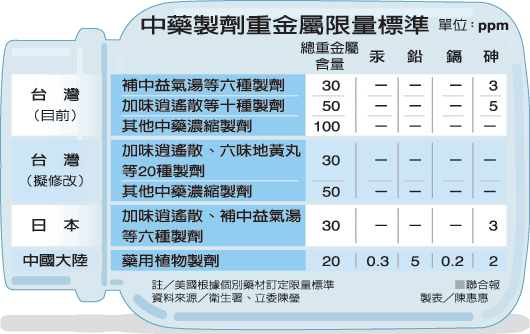Clipping Board » Medical Affairs and Administration ─ Medical system, pharmaceuticals, and medical community-related reports

 【United Daily News╱Reporter Chen Huihui/Taipei Report】 2009.12.15 06:14 am
【United Daily News╱Reporter Chen Huihui/Taipei Report】 2009.12.15 06:14 am
Domestic heavy metal limit standards for traditional Chinese medicine preparations have long been criticized as overly lenient. The Department of Health has announced plans to revise these standards downward.
Photo by Reporter Hu Jingzhou
The heavy metal limit standards for domestic concentrated traditional Chinese medicine preparations have long been criticized as too lenient. The Department of Health stated that it will lower the limit standards to 30 ppm for 20 commonly used preparations, including Jiawei Xiaoyao San and Liuwei Dihuang Wan, while other preparations will not exceed 50 ppm. A draft of these standards is expected to be finalized by May 30 next year at the latest.
Shengchang Pharmaceutical's "Xuefu Zhuyu Tang" contains lead levels that do not meet Hong Kong's regulations but can still be sold in Taiwan. Yesterday, the Department of Health presented a special report on the health standards for concentrated traditional Chinese medicine preparations to the Legislative Yuan's Social Welfare and Environmental Hygiene Committee. Legislators from both the Democratic Progressive Party (Chen Ying, Huang Shuying) and the Kuomintang (Luo Shulei, Zheng Rufen) criticized the current heavy metal limit standards as too lenient.
In addition to heavy metals, the Department of Health will also regulate pesticide residues and microbial standards for specific traditional Chinese medicinal materials. Concentrated traditional Chinese medicine preparations, including scientific Chinese medicine, receive over NT$90 billion in annual reimbursements from the National Health Insurance. In response to legislators' inquiries, Huang Linhuang, the newly appointed chairman of the Department of Health's Committee on Chinese Medicine and Pharmacy, admitted that he also finds the current standards unacceptable. The current limit of 100 ppm was adopted from Japanese regulations, but Japan has since revised its standard to 30 ppm.
Huang believes that the total heavy metal content for 20 commonly used concentrated traditional Chinese medicine preparations, including Jiawei Xiaoyao San and Liuwei Dihuang Wan, should be set below 30 ppm. "These 20 preparations account for 80% to 85% of total usage." If any of these 20 preparations exceed 30 ppm, additional tests for arsenic, cadmium, lead, and mercury will be required, with levels below 3 ppm to meet the standard.
For other concentrated traditional Chinese medicine preparations, the total heavy metal content must not exceed 50 ppm. Huang explained that this is because some traditional Chinese medicines may contain metals like copper and zinc, and the feasibility for manufacturers to meet the standards must also be considered.
Chen Ying's testing of commercially available scientific concentrated traditional Chinese medicines also revealed that out of 18 samples of Shujing Huoxue Tang, only two met the crude fiber content standards. In response, Huang Linhuang pledged to propose a draft health and safety standard for concentrated traditional Chinese medicine preparations by the end of May next year, aiming to set crude fiber content below 1%.

Source: http://udn. com/ NEWS/ NATIONAL/ NATS2/ 5308837. shtml
Stricter Limits on Heavy Metals in Traditional Chinese Medicine Preparations


Domestic heavy metal limit standards for traditional Chinese medicine preparations have long been criticized as overly lenient. The Department of Health has announced plans to revise these standards downward.
Photo by Reporter Hu Jingzhou
The heavy metal limit standards for domestic concentrated traditional Chinese medicine preparations have long been criticized as too lenient. The Department of Health stated that it will lower the limit standards to 30 ppm for 20 commonly used preparations, including Jiawei Xiaoyao San and Liuwei Dihuang Wan, while other preparations will not exceed 50 ppm. A draft of these standards is expected to be finalized by May 30 next year at the latest.
Shengchang Pharmaceutical's "Xuefu Zhuyu Tang" contains lead levels that do not meet Hong Kong's regulations but can still be sold in Taiwan. Yesterday, the Department of Health presented a special report on the health standards for concentrated traditional Chinese medicine preparations to the Legislative Yuan's Social Welfare and Environmental Hygiene Committee. Legislators from both the Democratic Progressive Party (Chen Ying, Huang Shuying) and the Kuomintang (Luo Shulei, Zheng Rufen) criticized the current heavy metal limit standards as too lenient.
In addition to heavy metals, the Department of Health will also regulate pesticide residues and microbial standards for specific traditional Chinese medicinal materials. Concentrated traditional Chinese medicine preparations, including scientific Chinese medicine, receive over NT$90 billion in annual reimbursements from the National Health Insurance. In response to legislators' inquiries, Huang Linhuang, the newly appointed chairman of the Department of Health's Committee on Chinese Medicine and Pharmacy, admitted that he also finds the current standards unacceptable. The current limit of 100 ppm was adopted from Japanese regulations, but Japan has since revised its standard to 30 ppm.
Huang believes that the total heavy metal content for 20 commonly used concentrated traditional Chinese medicine preparations, including Jiawei Xiaoyao San and Liuwei Dihuang Wan, should be set below 30 ppm. "These 20 preparations account for 80% to 85% of total usage." If any of these 20 preparations exceed 30 ppm, additional tests for arsenic, cadmium, lead, and mercury will be required, with levels below 3 ppm to meet the standard.
For other concentrated traditional Chinese medicine preparations, the total heavy metal content must not exceed 50 ppm. Huang explained that this is because some traditional Chinese medicines may contain metals like copper and zinc, and the feasibility for manufacturers to meet the standards must also be considered.
Chen Ying's testing of commercially available scientific concentrated traditional Chinese medicines also revealed that out of 18 samples of Shujing Huoxue Tang, only two met the crude fiber content standards. In response, Huang Linhuang pledged to propose a draft health and safety standard for concentrated traditional Chinese medicine preparations by the end of May next year, aiming to set crude fiber content below 1%.

Source: http://udn. com/ NEWS/ NATIONAL/ NATS2/ 5308837. shtml
2009/12/27 14:08

